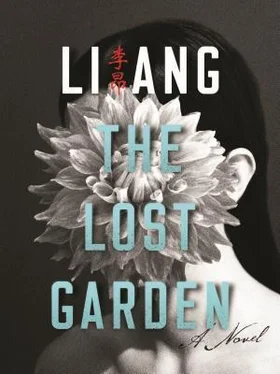Hence, she knew that in the end Lin Xigeng would have the final say and make all the necessary decisions once she eliminated the possibility of counterattack from Masao, which was what worried her most, and the interference and possible variables that could have resulted from his actions.
She should have been happy now that Masao’s sense of shame had prevented him from fighting back, but Yinghong was even more apprehensive; all she could do was wait patiently in her distressed state.
The rumor was confirmed; the explanation offered by consensus was that an error in decision making on Masao’s part had cost Lin several billions in revenue.
People in the realty business were critical of Lin. To be sure, it was a large sum of money, but Lin came out looking unforgiving for abandoning a business partner who had been with him for twenty years over money. It simply was not an action suitable for a major player.
Yinghong heard all these comments, including the news of Masao’s departure, from various sources, but not from Lin. She knew by then that she’d lost him.
It never occurred to her that Lin would make such a decision because of her. It was entirely possible that he had not been completely happy with Masao and had wanted to fire him, but no matter how she looked at it, she was the cause. Lin could have chosen an easier path by promising marriage, yet he opted for a drastic decision. She was caught by surprise and, moreover, she now realized that she would not get what she had hoped to have after all this time.
Finally Yinghong was thinking about leaving.
Lin continued to call and visit her, but he never asked her to return to work. Furthermore, shortly after Masao’s departure, the government initiated a policy to control the overheated real estate market. First, the mortgage interest rate was raised several times, and then reliable sources indicated that more steps, such as limiting construction on empty lots, would be taken, all of which were omens of a declining market to the perceptive real estate business owners.
As soon as housing prices began to drop, the market would be dominated by buyers, highlighting the importance of the flow of capital. The media and experts went into a frenzy predicting inevitable bankruptcy for unsound construction companies with too great an investment in land, because they would face a financial crisis once the banks began to tighten their money flow.
Rumors began to fly; people were talking about which construction company would be the first to fall. They talked glibly with jealous overtones about Lin Xigeng, who they believed would easily ride the storm due to the money he’d made from a large quantity of construction projects that Masao had sold.
Yet, for a few billions that he had thought were lost, Lin had gotten rid of someone with foresight who had made him rich. People in the business criticized Lin with contempt.
Yinghong knew, even before it happened, that the incident with Masao would cause irreparable damage to her relationship with Lin, but she was powerless to do anything about it.
Following the government’s measures to rein in the real estate market, housing prices began to drop, even with the immediate worries that the train-engine industry would no longer stimulate and create new prospects, which would result in a general economic downturn. However, the island nation, in the way it has always weathered the assault of typhoons and earthquakes, was equally resilient in terms of its economy, similarly adaptable to the soaring trend and the spiral downturn.
Some experts began to argue that no other country could go through such drastic fluctuations in housing prices without suffering major damage to its economy. In other words, the island that had seen overnight wealth from exports not only created an economic miracle but also extended the miracle into its ability to withstand a recession.
While the real estate business alternated between sudden highs and lows, the newly planted roadside golden shower trees steadfastly followed seasonable changes and burst into bloom with clusters of golden flowers. The new heights gained over the previous year sent the flowers higher into the sky, above and around the space below them. When the rains came, the assault of water and wind showered the ground with a blanket of golden flower petals.
True to his expansive nature, Lin suddenly stopped calling or coming to see her.
She waited in despair.
Winter arrived, bringing nonstop rain to Taipei again; gloomy rain clouds hung around northern Taiwan seemingly for an eternity. It rained for nearly three weeks with no sign of letting up. The sky appeared to have a hole in it, as rain continued to fall, never a downpour, but a lingering, unending drizzle that wove into a tight net that enshrouded the city in a basin that tended to retain moisture. The leaden sky pressed down on city streets submerged in grayish rain.
Yinghong was sitting on the second floor, looking through the French door at vivacious wild grass that bowed under the weight of the never-ending rain and collapsed into the water, where it began to rot. The long, thin blades were yellow with mud, emitting a faint, putrid odor. It had been nearly a week since she last left the house, but this time she did not stay inside waiting for the phone to ring. Instead, she spent most of her days sitting there, facing the yard, where the vegetation rotted in the rain.

In a state where everything seemed to have stopped, I waited, day and night, for something that was unknown even to me.
I felt no acute pain or sorrow; gone was the piercing heartache I’d experienced when Lin Xigeng broke up with me after we’d just met. I’d thought I’d have the same nightmare again, that I’d have the strange bodily pain, but that did not happen; I did not feel the unbearable ache from his departure that I’d felt upon wakening back then.
In the daytime I busied myself with minor household chores, emptying out a closet and discovering, to my surprise, many items I didn’t recall buying. Then I lost interest; I lacked the will to put them back and merely left them strewn around the room, waiting for a grumbling Mudan to tidy up.
Most of the time I sat alone, with no thought of listening to music. Occasionally, I’d open a book, but I got nothing out of it even though I understood every single line of text. My gaze flitted over page after page, until I realized that I had no idea what I’d been reading. My shock and fear would then prompt me to fling the book down.
I was in a stagnant state of nonaction, feeling no pain but strangely devoid of thought. When night fell, I’d turn on the TV as usual, and it took me several nights to see how TV news programs seemed to leave the least impression on me. There were no connections between the ever-changing, fast-paced segments, making it hard for me to follow, and then I’d be completely lost. I’d look but not really see the images, be they continuing battles in faraway places or pile-ups on local highways; when the sound was muted, what was left before my eyes was a series of flickering shadows rolling over one another, mystifying and unreal.
It turned out that TV drama was easier to follow, particularly the prime-time serials at eight, which tended to drag on forever; I could make the connections in the story line even if I caught only a few minutes of the plot development.
And so I became a couch potato. I’d watch every night till there was nothing on, when I’d be so exhausted I could not only finally get the sleep I so badly needed, but I could sleep through the night. I devoted a lot of time to sleeping. In addition to nine or more hours each night, I took afternoon naps, not because I was tired but because I needed it. I simply longed to sleep, to enter oblivion.
Читать дальше













